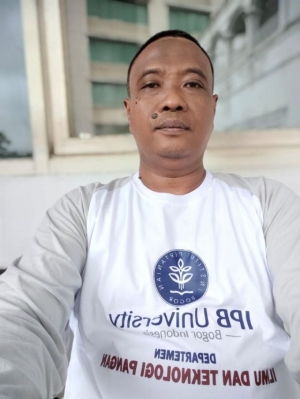Dr Tjahja Muhandri: Key to Improving Food Resilience is Family Food Diversification

Food plays an important role in society. Family food diversification, in particular, is key to efforts to improve food resilience and empower communities economically.
Dr Tjahja Muhandri, a lecturer at IPB University’s Department of Food Science and Technology, Faculty of Agricultural Technology, said the most important thing in food diversification is changing people’s awareness. This change in awareness is accompanied by understanding and sincerity. So that the direction of the community’s goals will shift towards food diversification.
“The most important thing is to get used to it, nutrition problems can follow. And the most important thing is to be willing first, be prepared first, and have a habit of consuming a variety of foods,” he said in a Webinar of Nutrition and Family Food organized by the Association of Employee Wives (IIK)-Perhutani, aimed at online members of IIK-Perhutani, (07/03).
After family food diversification becomes a habit, he said, the foundation of food resilience will begin to be built. Food will be sufficiently met in terms of quantity and quality, evenly and affordably. Indonesia can begin to move towards food self-sufficiency. Food is met without depending on other nations.
“When food self-sufficiency is capable, we will be free from the trap of food, we will not be able to be colonized by other countries,” he said firmly. According to him, Indonesia does not need to fulfill other countries’ food needs. However, Indonesia needs to have a bargaining position towards other countries so that there is a win-win solution.
He added that food diversification to reduce rice and wheat consumption must be able to produce products that can replace these commodities. Moreover, Indonesia’s favorite foods are bread and cakes. “If processed products such as brownies, cakes, sponge cakes, or biscuits use local flour, then it will replace wheat flour,” he explained.
According to him, this effort can minimize Indonesia’s food trap because of wheat imports. There are several prerequisites for an ideal food diversification product. Among them are availability, continuity and uniformity of quality, industry awareness, and competitive prices.
“For me, the most important thing is that the food tastes good, acceptable to consumers, and can be accepted by the culture of the community, then it can be intervened with nutrition,” he explained. He added that local carbohydrate sources in Indonesia are very diverse, such as cassava, sago, sweet potatoes, and so on. However, he revealed that some other commodities are still political or research commodities. So their cultivation still needs to be done wisely.
He explained that the direction of research and development of essential food diversification can be in the form of staple food substitution, staple food ingredient industries, or through value-added improvements. The advantages of local carbohydrate sources are not only as a substitute for staple foods. Its nutritional content is even considered healthier.
He boldly guarantees that consuming local food will be healthier. Some local food products have even been claimed to be gluten-free, higher in fiber, lower glycemic index, and have more varied amino acids.
“By consuming various local foods, its nutrition becomes balanced and better. Note that we need to start changing our culture,” he added. He also explained simple technology for processing local food, such as corn noodles, instant sorghum rice, and frozen cassava sticks that can be produced at home. (MW/Zul) (IAAS/AMR)



